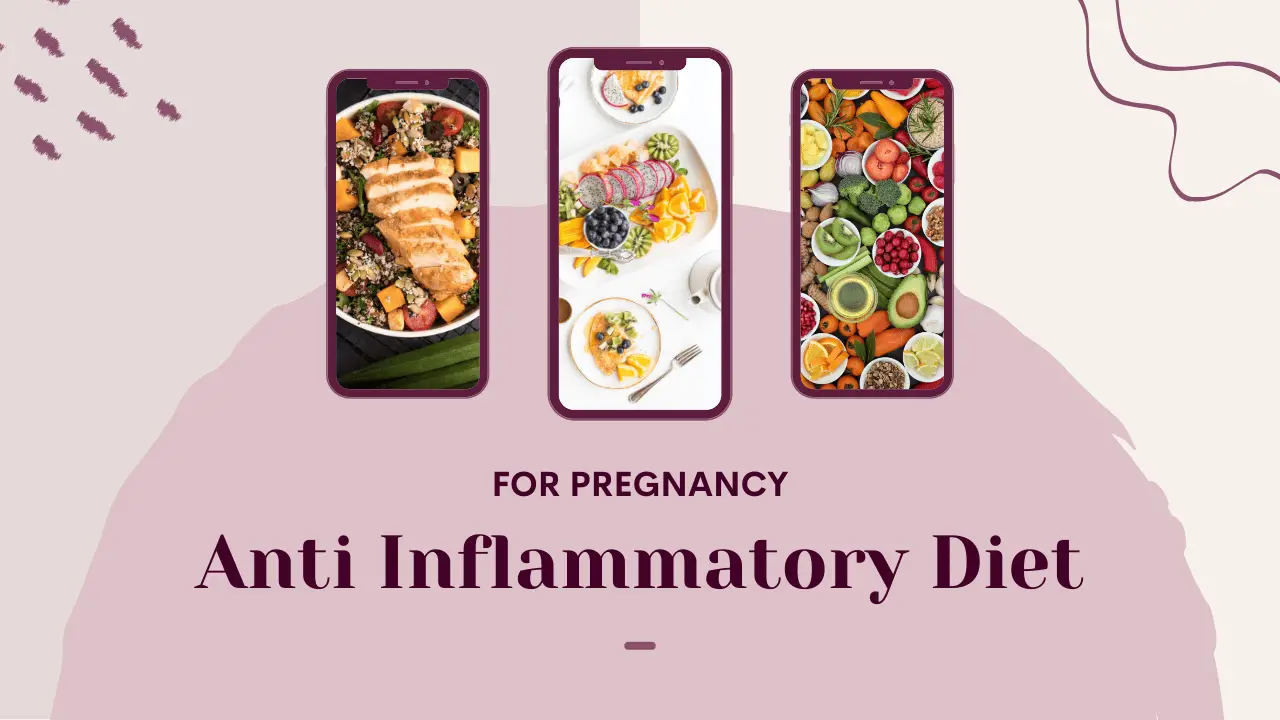Due to the significant physiological and metabolic changes that occur during pregnancy, careful consideration of food requirements is required. During this crucial stage, an anti-inflammatory diet becomes an essential nutritional approach with numerous advantages for both the mother and the developing fetus.
This nutritional paradigm promotes normal fetal development, lowers the risk of problems, and supports a healthy pregnancy by placing an emphasis on complete, unprocessed foods and reducing inflammatory agents.

This thorough analysis explores the essential elements of an anti-inflammatory diet for pregnancy, explaining its mechanisms of action and offering helpful advice for putting it into practice.
The Impact of Inflammation on Pregnancy:
Although it is a normal immune response, severe or persistent inflammation can have serious consequences on pregnancy. The body experiences several changes throughout pregnancy, and inflammation is frequently the body’s response to these changes.
On the other hand, unchecked inflammation can result in a number of issues. Preterm labor, gestational diabetes, and preeclampsia are among the many problems linked to elevated inflammatory levels during pregnancy.

These illnesses may have an effect on the health of the mother and fetus, possibly resulting in an early birth or low birth weight. Chronic inflammation can also be a factor in mother discomforts such as edema, back pain, and exhaustion.
An anti-inflammatory diet for pregnancy aims to reduce these risks by focusing on foods that combat inflammation and support overall health. This diet includes nutrient-dense foods rich in antioxidants, omega-3 fatty acids, and other anti-inflammatory compounds.
By incorporating such foods, expectant mothers can help manage inflammation more effectively, potentially reducing the risk of complications and improving their overall pregnancy experience.
Components of an Anti-Inflammatory Diet for Pregnancy:
Adopting a pregnancy-friendly anti-inflammatory diet entails carefully choosing important food groups and nutrients that work together to create a better environment for the mother and fetus. Whole, unprocessed foods high in fiber, antioxidants, omega-3 fatty acids, and vital vitamins and minerals are the focus of this nutritional strategy.
Pregnant women can effectively reduce inflammation, promote fetal development, and improve general well-being by adding these components.

Key Food Groups and Nutrients
- Fruits and Vegetables: These vibrant produce offer a plethora of antioxidants, vitamins, and minerals that combat inflammation and protect cellular health. Prioritize a diverse range of options, including berries, leafy greens, cruciferous vegetables, and citrus fruits.
- Whole Grains: Opt for whole grains like brown rice, quinoa, and whole-wheat bread, as they provide fiber, B vitamins, and magnesium, which contribute to a balanced inflammatory response.
- Healthy Fats: Incorporate sources of healthy fats, such as avocados, nuts, seeds, and olive oil, which are essential for fetal brain development and support a healthy inflammatory balance.
- Lean Protein: Choose lean protein sources like fish, poultry, beans, and lentils to provide essential amino acids for tissue growth and repair, while minimizing saturated and processed fats.
- Omega-3 Fatty Acids: Fatty fish like salmon, mackerel, and sardines are excellent sources of omega-3 fatty acids, particularly DHA, which is crucial for fetal brain and eye development.
- Antioxidants: Emphasize foods rich in antioxidants, such as berries, and dark chocolate, and spices like turmeric and ginger, which help neutralize harmful free radicals and reduce inflammation.
Foods to Avoid
While focusing on the key food groups and nutrients, it’s equally important to limit or avoid certain foods that can contribute to inflammation during pregnancy. These include:
- Processed Foods: Minimize consumption of processed foods, which are often high in unhealthy fats, added sugars, and sodium, and can exacerbate inflammation.
- Refined Carbohydrates: Limit refined carbohydrates like white bread, pasta, and sugary drinks, as they can spike blood sugar levels and contribute to inflammation.
- Saturated and Trans Fats: Reduce intake of saturated and trans fats found in red meat, processed meats, and fried foods, as they can increase inflammation.
- Excessive Sugar: Moderate your intake of added sugars, as excessive consumption can contribute to inflammation and other health issues.
- Alcohol: Avoid alcohol consumption entirely during pregnancy, as it can harm both the mother and fetus.
By adhering to these guidelines and making informed food choices, pregnant women can effectively implement an anti-inflammatory diet, promoting their health and ensuring the optimal development of their unborn child.
Benefits of an Anti-Inflammatory Diet for Pregnancy:
Adopting an anti-inflammatory diet for pregnancy offers several notable benefits that can enhance both maternal and fetal health. Here’s how this diet positively impacts pregnancy:
- Reduced Risk of Pregnancy Complications: Inflammation is linked to various pregnancy-related complications, including preeclampsia, gestational diabetes, and preterm labor. By focusing on anti-inflammatory foods, expectant mothers can lower their risk of these conditions, contributing to a smoother pregnancy.
- Improved Maternal Comfort: Chronic inflammation can lead to discomforts such as back pain, swelling, and fatigue. An anti-inflammatory diet can help alleviate these symptoms by reducing overall inflammation in the body, leading to a more comfortable pregnancy experience.
- Enhanced Fetal Development: Nutrients found in anti-inflammatory foods, such as omega-3 fatty acids, vitamins, and antioxidants, are crucial for fetal development. These nutrients support brain and eye development, and the overall health of the baby, ensuring that the fetus receives optimal nourishment.
- Better Immune Function: An anti-inflammatory diet strengthens the immune system, helping the body fend off infections and illnesses, which is particularly important during pregnancy when the immune system is naturally suppressed.
- Stable Energy Levels: By avoiding inflammatory triggers and focusing on nutrient-rich foods, this diet can help stabilize energy levels, reducing fatigue and maintaining overall vitality throughout pregnancy.
Overall, an anti-inflammatory diet provides a range of benefits that support a healthier pregnancy, enhance maternal comfort, and promote optimal fetal development.

How to Incorporate an Anti-Inflammatory Diet for Pregnancy:
Incorporating an anti-inflammatory diet for pregnancy into your daily routine involves making thoughtful choices about the foods you eat and how you prepare them. Here’s a detailed approach to seamlessly integrate this diet into your pregnancy:
- Plan Your Meals: Start by creating a meal plan that focuses on anti-inflammatory foods. Add different fruits, vegetables, whole grains, and proteins. Planning ahead helps ensure that you consistently consume meals that support reduced inflammation.
- Choose Anti-Inflammatory Foods: Incorporate foods known for their anti-inflammatory properties. Opt for berries, leafy greens, nuts, seeds, and fatty fish like salmon. These foods are rich in antioxidants, omega-3 fatty acids, and other nutrients that help lower inflammation.
- Cook with Healthy Oils: Use olive oil or avocado oil instead of processed oils or trans fats. These healthy oils contain monounsaturated fats that have anti-inflammatory effects and support overall health.
- Avoid Inflammatory Triggers: Reduce or eliminate foods that contribute to inflammation, such as sugary snacks, processed foods, and excessive sodium. Focus on whole, minimally processed foods to keep inflammation in check.
- Incorporate Spices and Herbs: Add spices like turmeric and ginger to your meals. Both have well-documented anti-inflammatory properties and can enhance the flavor of your dishes.
- Stay Hydrated: Drink plenty of water throughout the day to help maintain hydration and support overall bodily functions. Herbal teas, such as ginger or chamomile, can also be soothing and beneficial.
By thoughtfully integrating these practices into your diet, you can effectively follow an anti-inflammatory diet for pregnancy, promoting better health and well-being for both you and your baby.
Creating a Daily Anti-Inflammatory Diet for Pregnancy:
Developing a daily routine for an anti-inflammatory diet for pregnancy involves strategic meal planning and consistent choices that focus on reducing inflammation and supporting overall health. Here’s how to create a daily diet plan:
- Start with a Balanced Breakfast: Begin your day with a nutrient-rich breakfast that includes anti-inflammatory foods. For example, try a smoothie with spinach, berries, and flaxseeds, or a bowl of oatmeal topped with nuts and fresh fruit. These foods provide essential vitamins, antioxidants, and omega-3 fatty acids.
- Plan Nourishing Lunches: Opt for meals that combine lean proteins, whole grains, and a variety of colorful vegetables. A quinoa salad with mixed greens, chickpeas, and a drizzle of olive oil makes a nutritious and anti-inflammatory lunch.
- Include Healthy Snacks: Keep healthy, anti-inflammatory snacks handy to maintain energy levels and curb hunger. Consider options like almonds, apple slices with almond butter, or a small bowl of mixed berries.
- Prepare Anti-Inflammatory Dinners: Your dinner should focus on lean proteins such as baked salmon or grilled chicken, paired with roasted vegetables and a side of brown rice or sweet potatoes. This combination offers a balance of nutrients and reduces inflammation.
- Stay Hydrated: Drink plenty of water throughout the day. Herbal teas, such as green tea or ginger tea, can also provide anti-inflammatory benefits while keeping you hydrated.
- Cook with Anti-Inflammatory Spices: Use spices like turmeric, garlic, and ginger in your cooking. These spices not only enhance flavor but also contribute to reducing inflammation.
By incorporating these strategies into your daily routine, you can effectively maintain an anti-inflammatory diet for pregnancy, which supports a healthier pregnancy and overall well-being for both you and your baby.
Conclusion:
Adopting an anti-inflammatory diet for pregnancy is a proactive way to enhance both your well-being and your baby’s health. By focusing on nutrient-rich, anti-inflammatory foods and avoiding those that exacerbate inflammation, you can reduce pregnancy-related discomforts, support healthy fetal development, and minimize the risk of complications.
Consistent meal planning and smart food choices will help you maintain a balanced and nourishing diet throughout your pregnancy, ensuring a healthier and more comfortable journey. Click to learn more.
FAQs:
What is an anti-inflammatory diet for pregnancy?
It’s a diet focused on eating foods that reduce inflammation, such as fruits, vegetables, whole grains, and healthy fats, while avoiding processed and sugary foods.
Why is reducing inflammation important during pregnancy?
Reducing inflammation can lower the risk of complications, improve maternal comfort, and support healthy fetal development.
What are some examples of anti-inflammatory foods?
Examples include berries, leafy greens, fatty fish (like salmon), nuts, and seeds.
What foods should be avoided on an anti-inflammatory diet?
Avoid processed foods, refined sugars, excessive sodium, and trans fats, as they can increase inflammation.
Can I still enjoy my favorite foods on an anti-inflammatory diet?
Yes, you can still enjoy your favorite foods by finding healthier alternatives and incorporating them into your diet in moderation.
